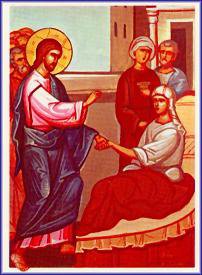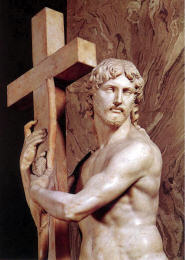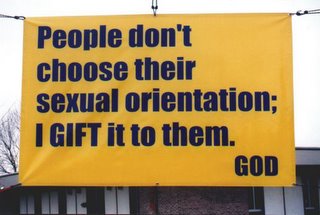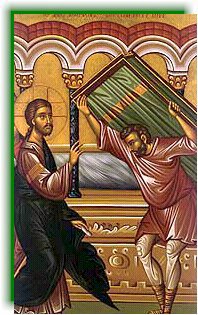"A Busy Weekend"
Mark 1:29-39I. Introduction –
Today’s Gospel reading from Mark picks up where we left off last week. Jesus had gone into the synagogue in Capernaum and served as guest preacher. He was confronted by a man with an evil spirit, which he promptly cast out of the man. And the people who heard and saw him were amazed by his power and authority.
 It’s still the Epiphany season. Our readings are still shedding light on different facets of who Jesus is, and what he is about. Today, if there’s one word to describe the way Jesus is presented, it might be this: “busy”. Mark, of all the Gospel writers, whose favorite word seems to be “immediately”, presents Jesus as a man with lots to do, and little time to do it. He is busy.
It’s still the Epiphany season. Our readings are still shedding light on different facets of who Jesus is, and what he is about. Today, if there’s one word to describe the way Jesus is presented, it might be this: “busy”. Mark, of all the Gospel writers, whose favorite word seems to be “immediately”, presents Jesus as a man with lots to do, and little time to do it. He is busy.
We know about “busy”. But today as we read about Jesus’ busy weekend, we think again not only of how much he does, but how much he does for us! Our busy Savior.
II. I’m Just So Busy
If there’s one thing people are nowadays, it’s busy. Find me the person that has too much time and not enough to do – and I will give you a medal. We are busy. We have full calendars and full plates. We juggle the responsibilities of family, work, play – of chores and errands, of commitments and involvements. And then there’s church on Sunday morning, which for many is way down on the priority list. And even though we’re all here today – maybe our minds are already on to all the other busy things we need to do next – today, this week, etc.
There’s a sin aspect to our busy business. When we take on too much or don’t balance our responsibilities well. When we mis-prioritize our time. I am reminded a phrase I have heard used more frequently, “Me-Time”. And, while it’s not always a sin to take time for oneself (and some need to do more of it), many are too selfish with their time. We’re not Jesus – we won’t (we can’t) balance our busy lives perfectly. We get it wrong so often.
Yet into the mixed-up mess of our hectic schedules comes Jesus Christ. Today we see that he, too, is busy.
III. Jesus’ Busy Weekend
Jesus Saturday started off in the Synagogue (as I mentioned, we read about that last week). Next, he is off to Peter and Andrew’s home – and to the bedside of Peter’s mother-in-law. Jesus’ afternoon doesn’t give him much “me-time”, as he heals the woman and shares a meal with his newly called disciples.
After the sun sets (and the Sabbath is officially over), Jesus’ Saturday evening is not spent out on the town. Rather, the town comes to him. Mark says, “The whole town gathered at the door, and Jesus healed many who had various diseases. He also drove out many demons” So it was a busy time. It was perhaps a late night. But Jesus got no overtime.
The next morning, Sunday, Mark tells us Jesus is up and at-‘em quite early. But he’s not out playing golf or going to rummage sales. Jesus goes off by himself to pray. Finally some “me-time”, or is it? I suspect that even then, Jesus’ prayers were not for his own sake, but for the sake of the people. Even if he did pray for himself, it was surely that he might have strength to continue serving, ministering, and loving his people.
When the disciples finally roll out of bed, they get busy looking for Jesus. Finally they find him, and (no rest for the weary), the demands on Jesus continue. “Everyone is looking for you” they said. And what truth they had spoken.
Still, today, in a sense, everyone is busy looking for Jesus. They just don’t always know it. Sin’s reality makes us aware that something is wrong with us – something needs to be fixed. It may not be a disease or a demon-possession, but our problems are just as real.
Everyone is busy looking for Jesus – but not always to the right Jesus. A Jesus who only leads by example and asks “what would I do?” is a poor excuse for a Jesus. That’s a Jesus of the Law. Not a Jesus of the Gospel. Our Jesus doesn’t ask people to do anything but believe in him and what he does for us.
Everyone is looking for Jesus, but not always for the right reasons. Some, like the disciples, even do it on Sunday morning. Perhaps even in church. If you have come here today mainly to give something to God, or do something for God, or praise him or serve him – then you are busy with the wrong things. Our first concern must be to receive what he gives us, on his terms, by his grace. Our business is to receive, and only then to respond.
And so, wherever Jesus was – praying – the disciples found him. “Everyone is looking for you Jesus”. It’s actually a nice confession of our need for Jesus. We too look for him – and to him – as the source of our blessings. And he does not disappoint.
He doesn’t book a vacation to some far off land. Rather than take a holiday from all the stress – Jesus gets busy again. He says, “Let’s go somewhere else – to the nearby villages – so I can preach there also. That is why I have come”.
There are more people who need him. So Jesus goes.
IV. “Why I have Come”
Did you catch what he said, though? He didn’t say, “Let’s go so I can heal some more people,” or, “Let me go cast out some more demons”. Jesus is focused in his task – his purpose – and that is to preach. He comes with a message. All the signs and wonders point to the message, his preaching and teaching and proclaiming of the Kingdom of God.
It was a message of greater healing than all the disease-busting he did. It was a message of even more defeat for the forces of evil than a simple exorcism or two. Jesus came to bring ultimate healing to the suffering sinner, and ultimate victory over our spiritual enemies.
Why did Jesus come? Well it was to preach, but not only to preach. As the ultimate prophet he brought God’s word to the people – he was – is – the very word of God made flesh. But this prophet is also a priest. And priests make sacrifice. And Jesus does the same.
In another purpose statement, Jesus says, “I have come that they might have life, and have it abundantly”. Of course the great surprise is that he brings life to us by offering himself to die. His sacrifice at the cross – and his resurrection from the dead – are the heart and foundation of his message. They are what make the kingdom of God accessible to us poor sinners. This too is why he came.
For on another busy weekend, Jesus had lots more to do for his people. It started on a Thursday, when he established a Holy Supper for his people, washed his disciples’ feet in service, and prayed in the garden. He was arrested, and a long night and morning of trials led to a hill outside of Jersusalem where he was crucified. Dying mid-afternoon and buried before sunset, his body lay in the tomb until early Sunday morning, when divine power burst open that grave, and his cold clay took on breath and life again. Then too, his disciples went looking for him. Then too, they would find him – not dead, but alive! Appearing to the women that Easter morning, and to the 12 later in the day – Jesus’ OTHER busy weekend is the one to remember. That too is why he came. And in all his work – in his dying and rising – he does it for us his people.
And as we come this Sabbath day – this day of rest from our busy-ness, we too hear the message of Jesus and his cross. And by that message we are healed of our sinful disease. And we receive victory over our evil foes. We get just what we need from the only one who can give it. Forgiveness, life, salvation offered in words of absolution, in remembrance of our baptism, in bread and wine that truly are Christ’s body and blood. Here the busy-ness stops, and the business of forgiveness gets done. Here we find pardon for all the times we are too busy, not busy enough, or busy with the wrong things. Here Christ is busy still, forgiving and loving us, his people.
“This is why I have come” Jesus said. What a busy weekend.
In His Name, Amen.
V. Conclusion
We may think we know what it’s like to be busy, but just ask Jesus. One busy weekend found him healing, casting out demons, praying, and of course preaching. But in all he does, Jesus has his people in mind. We are his priority.







